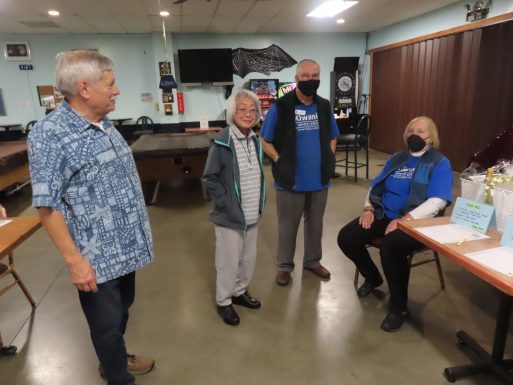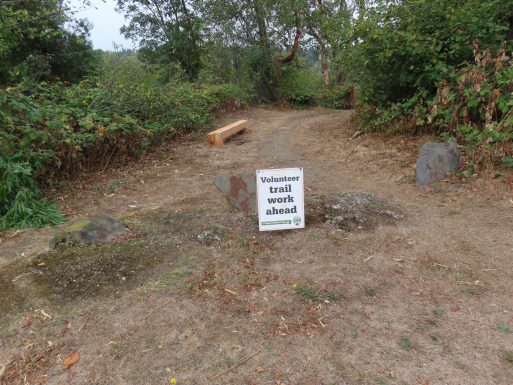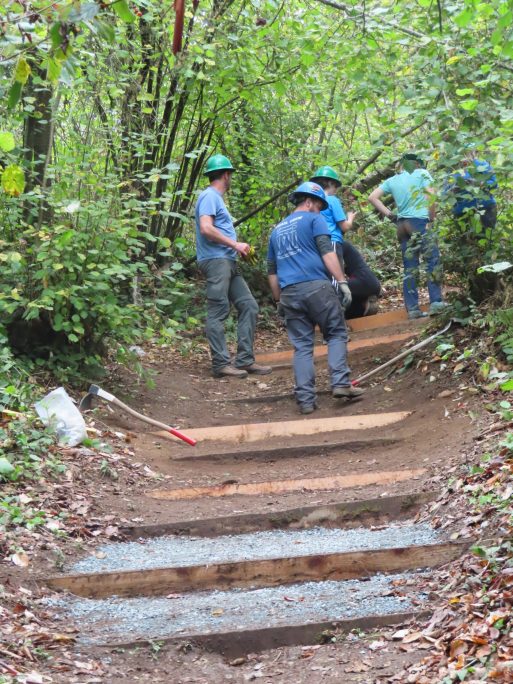By Tracy Record
White Center Now editor
The North Highline Unincorporated Area Council returned from summer hiatus with an online meeting illuminating issues from crime to the King County Council District 8 election.
The meeting facilitated by NHUAC’s Liz Giba started with announcements, including a political forum.
HIGHLINE SCHOOL BOARD RACES: Sandy Hunt dropped in to make sure everyone knows the League of Women Voters is presenting a Highline School Board forum tomorrow (Tuesday, October 10th) – here’s the info:

It’s happening in person. Hunt said that this is one of the “most important School Board (elections) we’ve had in a long time,” so you’re urged to go find out more about the candidates.
KING COUNTY SHERIFF’S OFFICE: KCSO Storefront Detective Glen Brannon and Community Resource Officer Nate Hammock – who also can be found at the Steve Cox Memorial Park office – appeared. Brannon said crime trends are “having a rough year” – up consistently from last year – “that kind of reflects coming out of COVID.” Lower-priority crime is trending “closer to normal” – He wanted to clarify “what you can expect from us and what you’ll see as time goes on,” including “the co-responders program.” Precinct 4 has funded six positions – mental health professionals paired up with deputies – to “really start doing more outreach” as most of the crime in WC is “survival crime – people shoplifting … to live.” He said throwing those people in jail “doesn’t work” so they are working with people to ‘get them out of the circumstances forcing them to do those crimes.” Two teams are out at work at the moment and a third time is riding with the Fire Department, while KCSO is hiring another team. Co-respondr cars work 7 days a week, starting at 8 am, contacting people early, with another one reaching out close to bedtime, and the third team filling in gaps. “I am a big fan of this.” He goes out with the teams when he can and develops relationships with people on the street. He said the ability to put people in jail “has not changed … for most property and misdemeanor crimes we still do not have the ability to take people to jail.” But they have LEAD. He jokes “they took away my stick but I’m going to hit you with the biggest carrot I can” – and that’s LEAD. That leads to referrals to counselors rather than prosecutors IF the suspect enrolls in services within 30 days and starts working on “getting their life better.” If they do, then they drop the potential charges.
Regarding KCSO staffing, “we are still down number-wise but for the first time in three years we are below the 100 mark” – fewer than 100 vacancies – less than half what it was a year ago. “We’re getting good people … and I’m very excited about it.” Within 2 to 6 months that should start reflecting in numbers of units on the street. “King County is a great place to work,” he said.
Does that mean the WC area might get another position? It’s staffed with two deputies but has funding for three, the detective said, adding that Sheriff Patti Cole-Tindall sat down with command staff and looked at where calls were the highest and that shifted more staffing to Precinct 4 (Burien etc.). What about diversity? That’s going pretty well, Det. Brannon said, noting that he’s working with “a young deputy” who speaks five languages.
An attendee asked about an “open-air drug market” near his neighborhood, near the 16th/107th mini-mart. “We do have a vibrant transient/homeless population in WC and we have for a long long time,” the detective acknowledged, saying it’s a situation they’ve long been working on, and that he never drives by that area without stopping to talk to anyone he sees. The co-responders are part of that.
Regarding the music-noise situation plaguing some neighborhoods west of downtown WC, Det. Brannon said a stage redesign and noise-deadening curtains are still supposedly in the work, and he is buying a decibel meter to help with enforcement. He says four bars are playing outdoor music; two are wrapping up for the season, and he’s working with the other two. But he said if they have to “get to the ticket-writing stage … we’re going to break some ground” because prosecutors say they’ve never pursued those kind of charges before. The tickets start at $125 and can scale up quickly, he added.
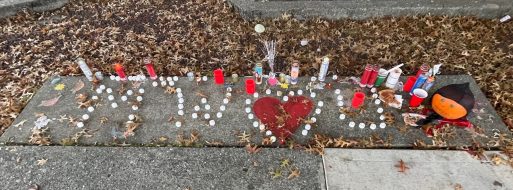 (WCN photo: Memorial for bus-shooting victim)
(WCN photo: Memorial for bus-shooting victim)
Major Mark Konoske was asked about the fatal shooting on a bus near 15th/Roxbury. “There was a variety of evidence available that we’re following up on … I’m optimistic we’ll end up catching some people … there are leads we’re following up on.”
Regarding burglaries in the area, He stressed the importance of reporting anything out of the ordinary – “call us and we’ll send a car out.” NHUAC’s Barbara Dobkin said that phoning things in can be frustrated – there was an obvious abandoned-likely-stolen car in her neighborhood and was told that it had to be there for three weeks before anything could be done (even though she saw suspicious activity around it) – finally it was taken, likely re-stolen, she said. Det. Brannon said whoever she spoke with misspoke, because vehicles on the street in unincorporated King County are supposed to be moved every 24 hours. Call it directly to his attention if they’re not getting traction some other way, he said.
CANDIDATE FORUM: Sofia Aragon and Teresa Mosaueda, finalists for the King County Council District 8 seat that Joe McDermott is leaving, were the guests. NHUAC’s Giba made it clear that the organization does not make endorsements but does work to inform citizens, and that was the reason for the forum. The candidates were given up to three minutes to answer questions. Mosqueda lives in North Delridge and Aragon lives in Shorewood. Each first received a chancr to introduce herself.
ARAGON: She is Burien’s current mayor. Her education involves two bachelor’s degrees and a law degree. Her experience includes the mayoral service and the challenges Burien has been dealing with – homelessness, drug use, housing, public health. She has lived all over the county including unincorporated areas so “I have an appreciation of the reliance on the county” by areas such as North Highline. She’s running because regional leaders “can do better.” Her goal to be “to focus on common-sense solutions.” She is an “immigrant child from the Philippines who grew up in South Seattle” and was inspired by her mom to become a nurse. As a mayor, she’s been taking action to combat the surge in drug-related deaths.
MOSQUEDA: She is chair of the Finance and Housing Committee on the Seattle City Council. Her experience has been in health and workers’ issues. She has worked to ensure the LEAD and Co-LEAD programs got investments, and programs similar to what was discussed earlier in the NHUAC meeting. She said she has worked to increase the Health One team in the Seattle Fire Department. “I have been on the forefront of helping to increase investments in our dual dispatch system,” and she said she looks at every investment “through the health lens,” which is why she wants to move to the King County Council. She has a Masters in public administration, and an undergraduate degree, and is a third-generation Mexican-American hoping to be the first Latinx to serve on the King County Council.
How much time did you spend in North Highline in the year before filing?
MOSQUEDA: She said her family spends some time in White Center, including the library, and looks forward to learning more about the area and its concerns.
ARAGON: She says the area has a “very lovely business district … that’s been hit hard” and she has dined there. She has also gotten prescriptions filled at area drugstores. She says she’s in the area “several times a week.”
Giba showed some stats showing that the area faces many health and economic and educational challenges.

She also showed stats comparing the area with Burien and West Seattle.
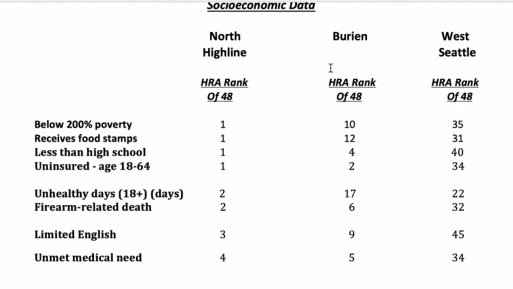
“The inequity continues throughout the entire 34th [Legislative] District.” So, she asked, if they agree that segregation is a problem on those many counts.
MOSQUEDA: She said she wishes people would see this data and “take to the streets” … absolutely we have a problem where economic (and other) segregation exists today,” as evidenced by that data. She said redlining maps of the past can be overlaid and you can see where those problems persist today. “Segregation persists in our community and it’s limiting where people can call home” She said shes worked in Seattle to look at public policy through that sort of lens, including an ordinance “recognizing racism as a public health crisis.” What she’d like to do on King County Council:
-create more affordable housing
-direct investments into food-security programs
-direct investments into climate justice
“This is a crisis,” she declared, and “exactly why I want to go to the county.”
ARAGON: She agreed it’s a problem and said that in Burien they look at whether certain populations “are isolated” and try to bring them together. Latinx is the largest population, she said, “and we have create a number of cultural events to really celebrate that heritage” as well as looking at services including being sure people can access them in Spanish language. That includes recruiting Spanish-speaking police officers, she said. “in the county we could do a better job,” maybe creating an economic-development office, she said. Looking at how North Highline “can maintain its uniqueness” while finding a way it can “grow and thrive,” too, she said. She also said that COVID put inequities in the spotlight along with “what are the things we’re doing and not doing to exacerbate these disparities,” such as providing services in Seattle but expecting people to make it there from around the county to access them.
Giba asked about 1,300 tax-exempt units with more than 1,700 bedrooms – as of 2018 – in North Highline. Many are occupied by children. Services rely on local taxes but tax-exempt properties aren’t contributing, she noted

She said the area needs better policies, not just programs, to deal with struggling schools serving those children. Giba named three local schools that are “over the tipping point.”
NHUAC’s Amelia C asked a question about economic and racial diversity.
ARAGON: Yes, they’re important, “it’s the changing nature of our world” and we need to embrace it. Regarding housing, she said mixed-use is a good model and policies encouraging those are good, as well as Habitat of Humanity-type housing models, and housing that serves 50% AMI, as well as supportive housing for the chronically homeless. Mary’s Place will be expanding in the Shorewood area of Burien, too. “All of that needs investment by governmental entities.”
MOSQUEDA: Yes, economic and ethnic diversity – and “all forms” of diversity – are an important goal. Gender, age, more. “We need to be welcoming and creating policies that welcome everything,” including recognizing that King County is about half POC and a fourth immigrant. Making sure that everyone has a place to call home is vital. Income diversity, too. LGBTQIA representation, to more. She also noted that the “upside-down nature of our tax code” is to blame for some of the problems Giba had spotlighted to open the question. She also noted she’s “led on gun violence strategies.” She says many issues are “intersectdional’ and will require “an intersectional approach.”
Amelia also asked what each would do to ensur tax-exempt housing was equitably distributed throughout the county, not just concentrated in North Highline.
MOSQUEDA: We should not be relying on property tax to fund public schools – “that’s just doubling down on the segregationist approach.” Washington’s tax system is the most regressive in the nation, and working to right that is vital.
ARAGON: Lobbying for the nurses association, she had advocated for a more equitable tax structure. She agreed that the current tax code is “highly problematic.” She said that there should be a way to see whether an area in need of more investment “can be first in line.” There’s a lot of strategies to focus on pepole already in crisis but kids need to be given tools to stay “out of that path.”
If elected, will you sponsor King County to use fact-based opportunity analysis?
ARAGON: She embraces data-driven decisionmaking. “The solutions also need to be community-based,” she said.
MOSQUEDA: “Fact-based policy is my jam!” she exclaimed. She believes in decisions “rooted n proven strategies.” She gave a few examples of ‘fact-based policies I’ve invested in over the years. One is investing in the youngest children. She also talked about how rent increases just after the pandemic found Mary’s Place seeing a dramatic increase in families showing up in need of housing – and voting to increase affordable housing is something on which she has focused.
NHUAC’s Dobkin asked the next questions, showing a map of zoning changes from the King County Subarea Plan. It’s changed from R-6, six units per acre, to R-18. The neighborhood is primarily single-family homes but intended to change, with inclusionary zoning. What is the candidates’ understanding of IZ?
MOSQUEDA: Seattle has done a lot of work on that, she said. It’s a “both/and” approach for building more housing to serve both people who are here and people who are coming here because it’s a great place to be. She said including greenspace is vital. New buildings need to reflect the neighborhood – some neighborhoods even have old pre-existing apartment buileings that blend in, or if not, “can be re-created … so that more people can live in our region.” She says that not creating more housing is ‘an environmental-justice issue” because then people have to live further out, commute farther to jobs, or live in housing that paves over green spaces.
Dobkin followed up that IZ is usually used to “integrate lower-income people into higher-income neighborhoods … so how does IZ in a lower-income neighborhood work”? Mosqueda said that it’s a matter of diverse “price points,” and ownership opportunities as well as rentals. She said it’s important that IZ not displace existing low/moderate-income residents.
Where else has IZ been built in King County? Dobkin pressed. Mosqueda mentioned Yesler Terrace.
ARAGON: She said it’s not just a matter of integrating with “high income” but also with “market rate.” Overall, she thnks it’s a “great concept” but some details need to be worked out, such as “what percentage” of units need to be affordable? Should there be affordable housing countywide? It’s important to place it strategically around the region. She said Burien has a history similar to North Highline – “we always felt as if things were being done to us.” She said it’s a plus that she’s used to dealing with that. She also understands the importance of having a discussion with a community before coming up with a plan like this. Infrastructure is important too.
Dobkin went on to talk about what she called “destructive” construction that’s led to a “tremendous amount” of tree-cutting without infrastructure to support increased density – no sidewalks, “rural” streetlighting, etc. “We don’t have enough parks (or) greenspace.” Though the county assured residents it wouldn’t happen overnight, people are already buying up property. So, what steps woud the candidates take to support current and future improvements to facilitate the density increase?
ARAGON: She reiterated that her experience with Burien’s unique challenges mean she’s suited for working on issues like that.
MOSQUEDA: She said it’s important to recognize that policies can be felt by communities like this as just piling on to burdens they already bear, situations in which they historically have not been heard, have not been at the table. To “right that wrong,” communities need to be brought to the planning “table.” Specific discussions about trees, sidewalks, etc. are vital, and she understands that previously, it seemed like “development going rogue.” She said there’s a county effort to do an inventory of greenspace. She agrees that streetlighting is a key component of community safety. Seattle City Light needs to show that area the same urgency for responsiveness and investment, and she can bring her experience of having worked on a committee overseeing it. She also talked about regulating short-time rentals.
The floor was opened to community member questions, but there were none. So Giba asked another question: Since KCSO deputies can’t book suspects into jail for crimes like theft and vandalism, what do you think of that and what steps will you take to improve public safety?
ARAGON: The talk of “defunding police” a few years ago was harmful. The system has racism and bias, but that can be improved. What she heard in the question is that current laws aren’t being enforced “and that IS problematic … (so) we need to address the officer shortage.”
MOSQUEDA: Much of what KCSO discussed earlier in the meeting is needed, along with hiring additional officers, which she has supported in Seattle. But “fewer people … are coming to that profession” so it’s important to help free up officers from responses that don’t require armed law enforcement. She wants to ‘double down” on programs like LEAD and Co-LEAD, and Community Passageways, “to come and help people instead of arresting them.” But “we also know that our jail is at capacity … and understaffed” and has bad health conditions, so King County Executive Dow Constantine is “trying to close down that jail and find safer places for people to go.”
NEXT MEETING: (corrected) November 2nd. (That’ll be five days before voting ends in the general election, on November 7th.)










